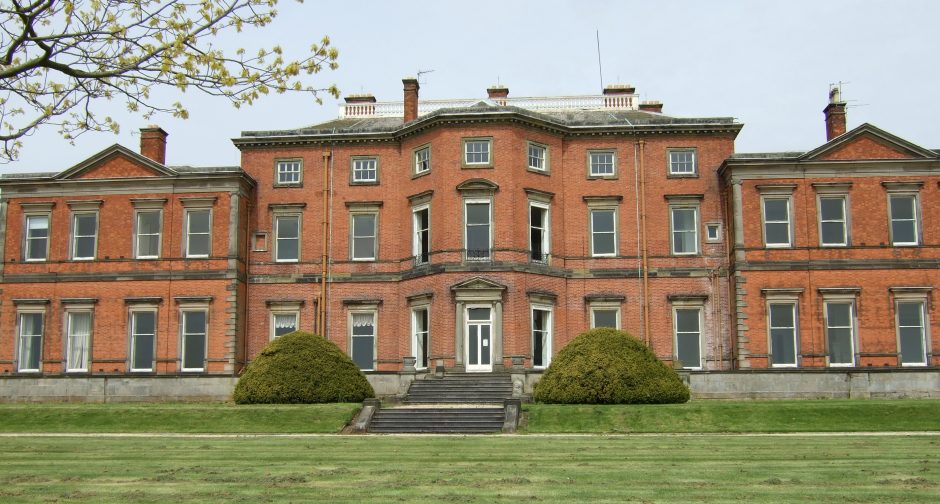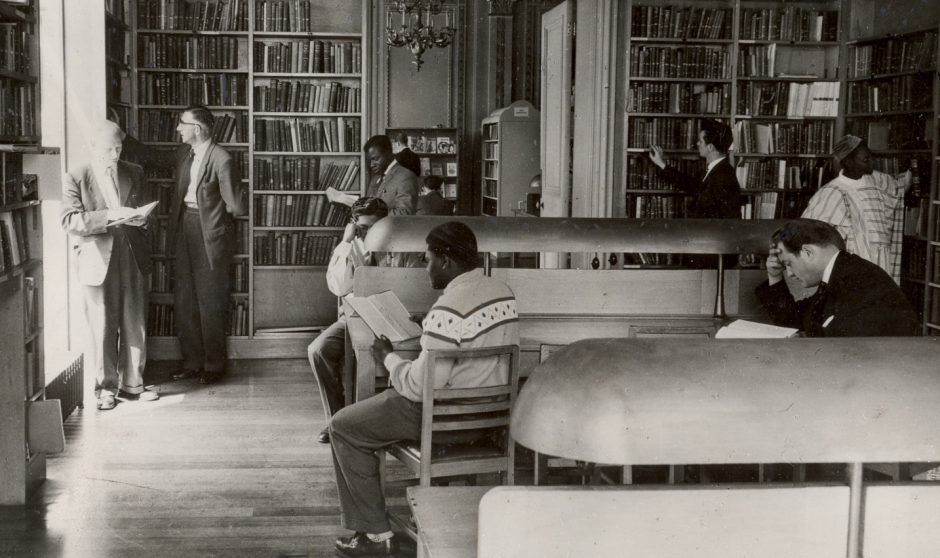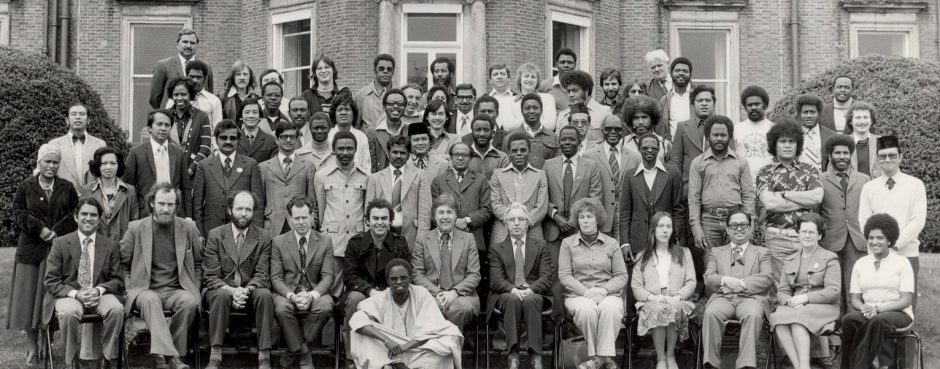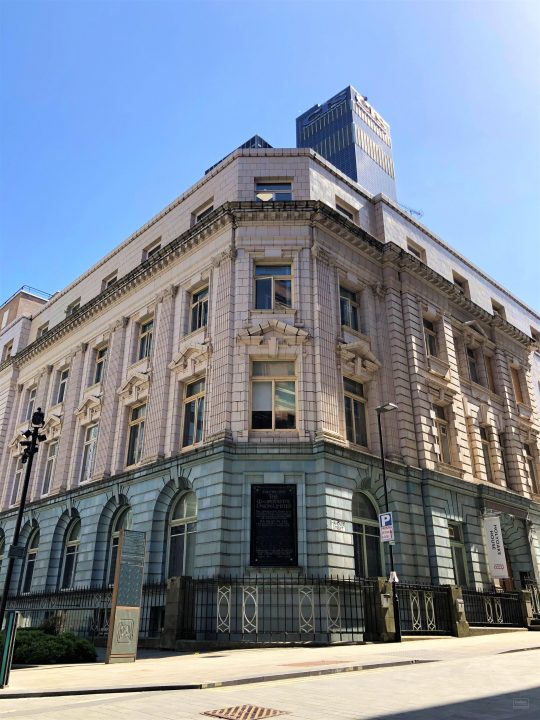Two years ago the Co-operative College celebrated its centenary with a conference in the magnificent surroundings of Rochdale Town Hall, just a few streets away from the birthplace of the co-op movement. After over 100 years in which thousands of students at home and abroad had benefited from its unique offering there was much to look back on with pride.
The College was founded by the then Co-op Union in 1919 as ‘a centre for higher education in the specialised subjects required for the full equipment of the co-operator and the further development of efficiency in the Co-operative Movement’.
The first cohort was 10 overseas students based at Holyoake House in Manchester. During the 1920s and 1930s student numbers remained small with between 30 and 40 students attending full-time programmes. Generations of co-op and credit union employees rose through the ranks on scholarships funded by the movement, learning all about the history of co-operation, economics, governance and practicalities like book-keeping. The college also attracted international students.
In 1938, of 37 students, 11 were variously from the USA, South Africa, Iceland, China, Ceylon, Estonia, Czechoslovakia, Egypt and Denmark. However the looming shadow of WW2 led to a decrease in numbers and during the horrific Christmas Blitz of 1940 which cost thousands of lives and destroyed much of Manchester city centre two incendiary bombs caused major damage to Holyoake House.

In 1945, following a financial appeal, the stately Stanford Hall near Loughborough was purchased for £54,000. It was to be the College’s iconic home for the next 55 years. Some residential courses in management were extensive ones taking as long as two years. By the 1960s however, the retail co-op movement had changed along with the world of workplace learning. The number of consumer societies had significantly reduced following mergers. Retail co-operatives no longer necessarily led the market and a drop in surpluses meant cuts to employee education and training budgets. Many societies chose to take things in-house. Financially, the College began to struggle and in 1997 the decision was taken to close the international programmes because of the recruitment problems. Stanford Hall with its extensive grounds was finally sold in 2001.


The College returned to its roots at Holyoake House in Manchester and there were lots of innovative projects reflecting changing times. Educationally, instead of residential programmes, the College expanded its provision of courses delivered locally for members. There were also programmes delivered for co-operative staff refocussing on core values and principles. The international dimension was restarted as well with support from the UK government and European Commission. This included research and policy work as well as collaboration in several large-scale international development projects which included the Coop Africa project from 2008-11 in nine African countries. The College also worked closely with other European co-operative apexes to build a partnership with the European Commission and raise the profile of co-operatives in their international development policies and programmes.
However, the homecoming was not universally welcomed by everyone as the Hall closed its doors and residential courses came to an end. Not everyone accepted that new strategies were needed to reflect changing times and training priorities. Linda Shaw, vice principal from 2001 till 2015, recalls: “The problem was that some people conflated the work of the College with the building and that change was a big challenge to them.
Interview: College head of business development Nina Valvi looks to the future
“A lot of people in the co-op movement were very fond of Stanford Hall and there was a lot of sadness around its closing. In hindsight perhaps what we should have done was emphasised more the positives of coming home and reaching out to people instead of them having to come to Stanford to learn.”
The 20 years following the move from Stanford Hall brought more financial challenges. In 2016, the College became a member-led charity with Charitable Incorporated (CIO) status. However in 2019 it lost the management agreement – and income – they had with the Co-operative Heritage Trust. Then in 2020, unrestricted funding was pulled by the Co-operative Group. The latter blow came against a backdrop of financial losses of over £1.5m in the last seven years.
In the summer of 2020, following increasing concern at the financial projections for the coming year, it was decided that a Scenario Planning Group, consisting of members from both the College’s management team and board of trustees, would need to be constituted. Significant changes – including a full restructure – were proposed, together with a move to a smaller office base, greater home-working and a 4-day week. Seven full time staff members were made redundant, some of whom had been with the College for many years.
One former colleague said: “We lost funding from the Co-op Group and other co-op organisations had lost confidence in us. We tried to do too much and an awful lot of money was spent on consultancy around projects like the Co-op University.
“Covid-19 had a massive impact but the College had been in financial difficulties for some time. We were never given details of what the various scenarios were.
“We complained a lot about not being proactively involved but were not listened to. We basically all turned up to a meeting, were presented with a new structure and told some of you are losing your jobs.”

Jon Nott, recently appointed as the College’s chair of trustees following the death of former chair Nigel Todd in March, said the Scenario Planning Group had considered a number of options and consulted extensively with staff on the proposals.“It is never a pleasant situation when people lose their jobs. However, there was a consultative process and we have acted in the best interests of the College. We are now in a situation where we have the right team, right size organisation and are able to take things forward with a new senior management team.
“The process of responding to the Covid-19 crisis meant we needed to accelerate the search for a sustainable business model. We went through a root and branch review of our strategy and cost base, a very clear set of programmes to work on and a staff structure that would enable it and give a platform to grow again. It was absolutely critical to not only survive but come out with a clear plan and solid structure with financially sustainable solutions.”
There has been some concern that its cash woes in recent years may have significantly eaten into the £3m raised by the sale of Stanford Hall. Mr Nott was clear that preserving the financial legacy was one of the reasons for restructure . “It was not only about survival but coming up with a clear plan and solid solutions which were financially sustainable so we do not have to rely on that endowment and it can be used to build exciting new projects.”
One project which will not be going ahead in the foreseeable future is the Co-op University – currently mothballed despite thousands of pounds worth of investment in recent years.
“Establishing a Co-operative University was an ambition of the College from its beginnings in 1919 onwards and the most recent round of higher education (HE) reforms in 2017 which removed some of the barriers for alternative providers presented a real opportunity but Covid-19 has completely destroyed that for now.
“We can’t be certain when the process of accrediting new HE institutions will start again so for now we need to focus on things we have control over, like looking at other ways we can deliver education. A major piece of work we have been doing over the past year is partnerships with existing universities at home and abroad around co-operative studies, particularly Mondragon University in Spain.”
Mr Nott acknowledges that recent years have not been easy for the College but says Trustees are resilient and optimistic about the College’s future. ”We are at the end of a long period of transition. We had to change in a changing economy, there is much more competition out there as far as workplace training goes and it became much harder to compete.

The College had a large number of programmes carrying on, was trying to invest in new areas like the University but did not have a stable business model so we took a decision to move to a more sustainable one.
“The individuals we are bringing in have really strong groundings in the movement. Our new head of business is from the voluntary sector, has a background working in heritage and arts and totally gets the co-op ethos. We have always been at the forefront of radical learning but we can’t sit back on our laurels.
“We need a new generation of co-op executives who can continue to support the movement. One of the things that is really exciting is how naturally co-operative young people are.
“One thing we have realised as a result of Covid-19 is how differently we can all work together. This radical rethink for us is accelerating a process that was already happening and already going through and is a strong model for the college going forward.”
A spokesperson from the College said it was now ‘imperative’ that all anchor institutions work together to deliver the best value and service for everyone in the movement.
“The Co-op Group’s decision to change its funding model affects not only the College but other organisations too. Our 2018-19 annual report showed an improving financial position but as a small organisation with charitable status, we’ve understandably not been immune from issues that have impacted both our supporters and fellow institutions, such as the credit crisis, reduction in training budgets, available funding for projects and more recently the Covid-19 pandemic.
“March 2020 hit the College as hard as it hit so many businesses, and the most significant impact to come out of the pandemic affected our ongoing work towards attaining degree awarding powers. Significant investment had gone into the Co-operative University Project, but as the impact of the pandemic on the higher education sector became clearer, the Office for Students paused all applications for degree awarding powers until further notice. This meant we had to reconsider the viability of the project, and therefore we are currently exploring other routes to accreditation of learning at all levels up to and including higher education.
“Our work will always align with our founding principles, and the College has a clear recruitment process across all roles to ensure that the founding values and principles of co-operation are retained and developed. We are looking forward to welcoming a new CEO later this year.”
It added that with greater financial stability, the College would have “strong foundations upon which to rebuild”.
“The College’s 101st year has been like no other, but the world has come together in response to the pandemic and we firmly believe that the College is preparing, as it must, to be fit for purpose in a world where co-operation and co-operative education have never been more needed.”
Former vice-principal Linda Shaw also remains hopeful about the College’s future. “In its 100 years of existence, the College has had to navigate through a turbulent century as well as respond to the changing contours of co-operation. No one is underestimating the challenge we face, however I think the movement still needs a centre for learning and education and international work which is what the College has always done.”